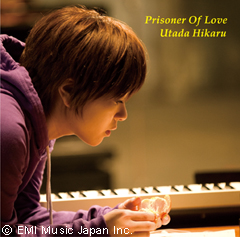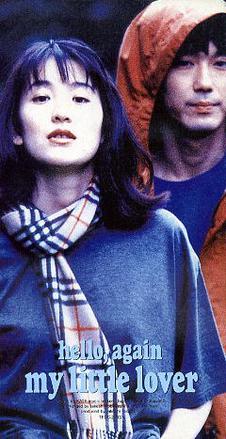Related Research Articles

"Boku wa Kuma" is a song by Japanese American singer-songwriter Hikaru Utada, serving as their 17th Japanese single and 24th single overall. The single was released on November 22, 2006, following the release of their previous studio album, Ultra Blue (2006). It came two months after the conclusion of Utada's United 2006 tour.
"Flavor of Life" is Hikaru Utada's 18th Japanese single. The physical single was officially released on February 28, 2007.

"Beautiful World" is a song by Japanese American musician Hikaru Utada. It served as the theme song for Evangelion: 1.0 You Are (Not) Alone, the 2007 film reboot of the anime Neon Genesis Evangelion. It was released as a double A-side single on August 29, 2007 along with her song "Kiss & Cry", which had been released digitally three months earlier. In 2009, a remix of the song, "Beautiful World " served as the theme song of the second film in the series, Evangelion: 2.0 You Can (Not) Advance.

"Prisoner of Love" is Hikaru Utada's 21st Japanese single and 30th single overall, released on May 21, 2008. This was her first Japanese recut single in nine years, after the first one "First Love" in 1999. It is also her first single to be released only in CD+DVD format. "Prisoner of Love" serves as the insert song for the Japanese television drama, Last Friends, while the original version is used in the opening theme. It won the Best Theme Song Award in the 57th Drama Academy Awards. "Prisoner of Love" was the 3rd most downloaded song in Japan during 2008.
"Eternally" is a song by Japanese musician Hikaru Utada, from their 2001 album Distance. It was re-arranged in 2008 as "Eternally (Drama Mix)" for use in the Maki Horikita starring Fuji TV drama Innocent Love. It was released as a digital single on October 31, 2008, and eventually released onto CD in March 2009, on an EMI compilation album I: Zutto, Zutto, Aishiteru (i(アイ)~ずっと、ずっと、愛してる~).
The discography of Japanese contemporary R&B singer and Thelma Aoyama consists of seven studio albums, six compilation albums, one extended play, one remix album, one cover album, two video albums and numerous solo and collaboration singles. Aoyama debuted as a musician in 2007 under Universal Music Japan, and became famous through her collaboration song with rapper SoulJa, "Koko ni Iru yo". Aoyama's version "Soba ni Iru ne" became one of the most successful songs of all time in Japan, certified for three million ringtone downloads and three million downloads by the RIAJ.
SoulJa is a Japanese hip-hop musician and songwriter best known for his collaborations with singer Thelma Aoyama, "Koko ni Iru yo" and "Soba ni Iru ne" – the latter of which was the former Guinness World Records holder for the best selling digital single of all-time in Japan.
Lil'B is a Japanese female pop duo, consisting of singer Mie and rapper Aila. They debuted in 2008 with "Orange," the 15th ending theme song for the anime Bleach. They are best known for their song "Kimi ni Utatta Love Song," which topped the RIAJ's monthly ringtone chart in 2008. They are also well known for their single "Tsunaida Te", which was the 3rd ending theme song for the anime Fullmetal Alchemist: Brotherhood.

Suki de, Suki de, Suki de./Anata dake ga(好きで、好きで、好きで。/あなただけが / Love, Love, Love./Only you) is a single by Japanese R&B/pop singer Koda Kumi. It is a concept single, featuring three different ballads with three different music videos. The B-side of the single, walk ~to the future~, is a re-arrangement of walk from Kumi's 2002 debut album, affection.

"Hello, Again " is a song by Japanese band My Little Lover. It was released as a single on August 21, 1995, and is currently the band's biggest hit single.

"Hotaru/Shōnen" is the twenty-sixth single by Japanese artist Masaharu Fukuyama. It was released on 11 August 2010.

"Kimi tte" is a song by Japanese pop singer Kana Nishino. It was released as her 12th single on November 3, 2010. The song was marketed as a "heart-warming tender" mid-tempo ballad in the initial press release, also describing the lyrics as being about "scaling up passion to love."
"Can't Wait 'Til Christmas" is a song by Japanese singer-songwriter Hikaru Utada. It was released on Utada's second Japanese compilation album, Utada Hikaru Single Collection Vol. 2, on November 24, 2010.

"Ai o Komete Hanataba o" is a song by Japanese pop-rock act Superfly. Used as Edison no Haha's theme song, "Ai o Komete Hanataba o" was released as the band's fourth single on February 27, 2008. The song was Superfly's break-through single, breaking into the Oricon physical singles chart's top 20. As of 2011, it is Superfly's most successful single, being certified as a million ringtone download, triple platinum as a cellphone download, and single platinum for digital sales.
The discography of Monkey Majik consists of thirteen studio albums, five compilation albums and numerous singles and digital downloads. The band's releases were originally self-released in Sendai, after which they were signed to independent label and management Under Horse Records, and released material through there between 2004 and 2005. In 2005, Monkey Majik were signed to major label Avex Entertainment, and continue to release under the Binyl Records sub-label.
The discography of Japanese pop singer Kana Nishino consists of seven studio albums, six compilation albums, thirty-four singles and ten video albums. Nishino debuted in 2008 under Sony Music Japan, and gained national recognition with the singles "Tōkutemo" and "Kimi ni Aitaku Naru Kara" (2009). Nishino has released some of the most digitally successful songs in Japan: "Motto..." (2009), "Dear..." (2009), "Best Friend" (2010), "Aitakute Aitakute" (2010), "If" (2010) and "Kimi tte" (2010), all of which were certified million by the RIAJ.
The discography of Japanese pop and jazz vocalist Juju consists of six studio albums, four tribute albums, two extended plays, two live albums, five video albums and numerous singles. Juju debuted as a singer in 2001, collaborating with artists such as DJ Masterkey, Spontania and worked on the soundtrack for the film Kyōki no Sakura.
The discography of Japanese pop group AAA includes eleven studio albums, six extended plays, seven compilation albums, eight live albums, one cover album, three remix albums, and 52 singles. All of the group's releases have been with Avex Trax, a subsidiary of Avex Group.
References
- ↑ 宇多田ヒカル / ULTRA BLUE. CD Journal (in Japanese). Archived from the original on December 24, 2010. Retrieved December 29, 2020.
テクノ/エレクトロのテイストをたっぷりと取り込んだトラック・メイクに、まず驚かされる。
- ↑ ITmedia News:iTunes年間ランキング、トップは宇多田とモーツァルト
- ↑ "レコード協会調べ 2月度有料音楽配信チャート(「着うた(R)」)<略称:2月度レコ協チャート(「着うた(R)」)>" (in Japanese). RIAJ. 2007-03-20. Retrieved 2010-09-18.
- ↑ レコード協会調べ 3月度有料音楽配信認定 <略称:3月度認定>. RIAJ (in Japanese). 2007-04-20. Retrieved 2010-11-02.
- ↑ レコード協会調べ 12月度有料音楽配信認定 <略称:12月度認定>. RIAJ (in Japanese). 2010-01-20. Retrieved 2010-09-18.
- ↑ レコード協会調べ 8月度有料音楽配信認定 <略称:8月度認定>. RIAJ (in Japanese). 2006-09-20. Retrieved 2010-09-18.